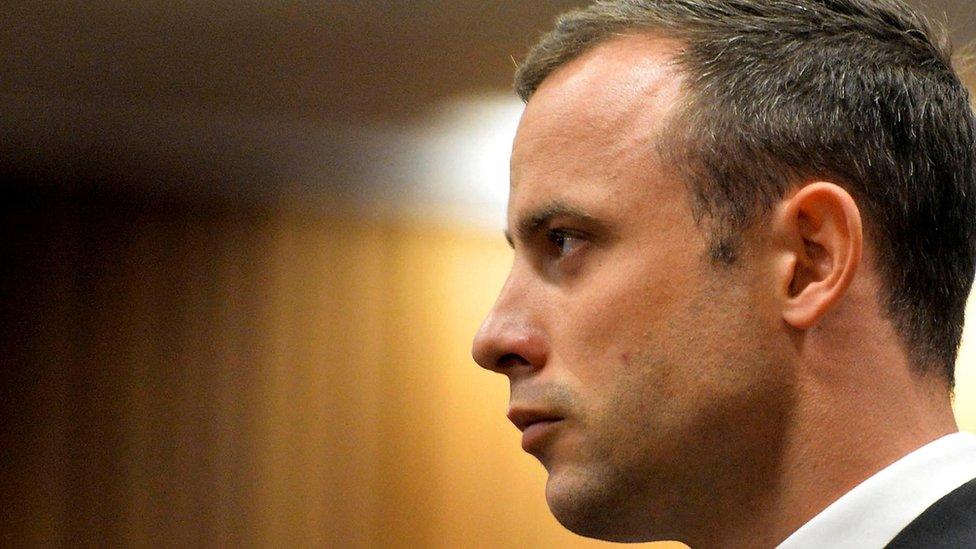Oscar Pistorius makes new parole bid 10 years after killing girlfriend Reeva Steenkamp
- Published

Pistorius is serving 13 years for murder, after killing his girlfriend, Reeva Steenkamp, in 2013.
Former Paralympic champion Oscar Pistorius is making another bid for early release from the South African prison where he is serving over 13 years for murdering his girlfriend.
Pistorius shot Reeva Steenkamp 10 years ago at his home in Pretoria in a killing that shocked the world, and was jailed for murder in 2016.
Ms Steenkamp's mother, June, is not opposing parole.
She however said she was not convinced that Pistorius was rehabilitated.
June Steenkamp is not attending the hearing at Atteridgeville prison, just outside the capital, Pretoria. She said she "simply cannot muster the energy to face [Pistorius] again at this stage".
Reeva Steenkamp's father Barry died in September and his "demise had opened the wounds in many ways caused by Reeva's death".
A victim impact statement from her is being read to the parole board.
She wrote that she doubted that Pistorius was rehabilitated because "rehabilitation requires someone to engage honestly with the full truth of his crime and the consequences" and she did not feel that he had engaged "honestly with the full truth of his crime".
Reeva Steenkamp, who was 29 when she died, was a law graduate and successful model.
She was killed when Pistorius fired four shots with a pistol through the door of a toilet cubicle at his house in Pretoria in the early hours of Valentine's Day in February 2013.
Pistorius, now 37, said at trial he thought an intruder was present in the house and that Ms Steenkamp was still in bed.
He was convicted of murder in 2015 at the Supreme Court of Appeal having initially been convicted of the lesser offence of culpable homicide.
The Supreme Court ruled that Pistorius's account of the night "varied substantially" and that he had "fired without having a rational or genuine fear that his life was in danger".
"I do not believe Oscar's version that he thought the person in the toilet was a burglar. In fact, I do not know anybody who does. My dearest child screamed for her life; loud enough for the neighbours to hear her," June Steenkamp wrote in her statement.
She said she was also concerned for the safety of women if his behaviour had not been addressed in prison.
It is unclear how long the parole board will take to make its decision, but it could be fast. In the event Pistorius is granted parole, a date will be set for his release.
Among other factors, the parole board will consider Pistorius's conviction, his conduct while in prison and the risk he poses to the public.
A first parole hearing for Pistorius in March collapsed when the authorities decided he had not completed the minimum detention period required to be released.
But last month, the Constitutional Court found that was a mistake, leading to Friday's hearing.
Pistorius's lower legs were amputated when he was less than a year old. He subsequently relied on prosthetics and became a world-renowned athlete known as the "blade runner".
He won multiple gold medals at the Paralympics. He also competed against non-disabled athletes at the London 2012 Olympics.
The murder of Reeva Steenkamp and subsequent criminal process dominated headlines around the world.

Sign up for our morning newsletter and get BBC News in your inbox.
